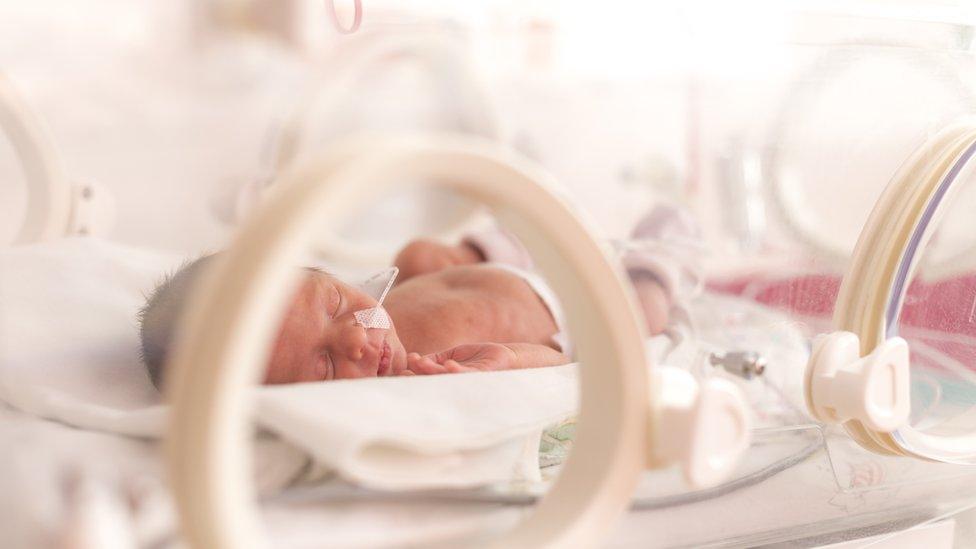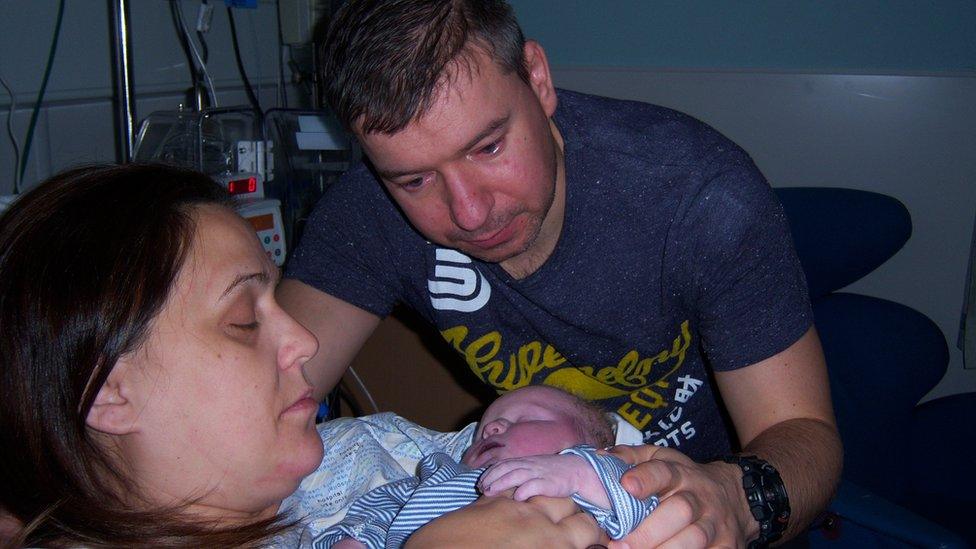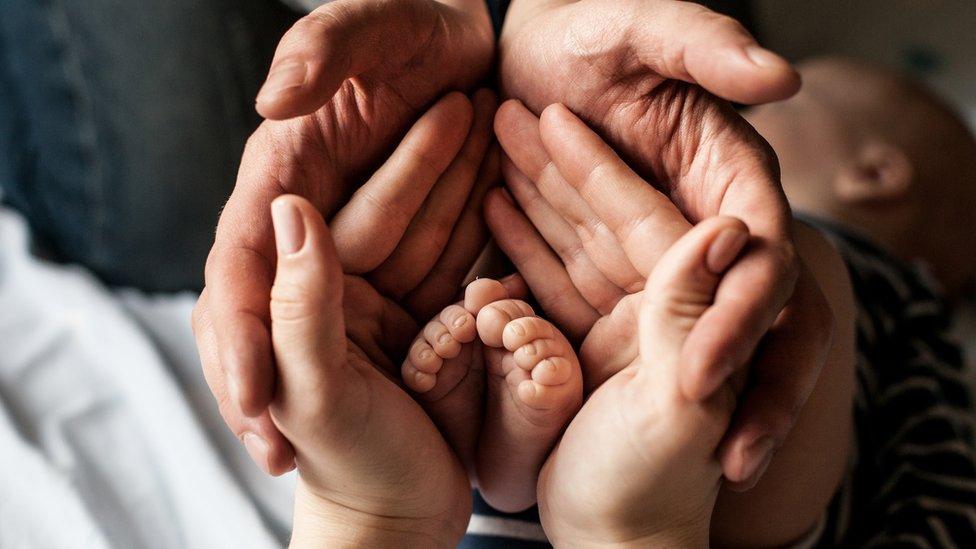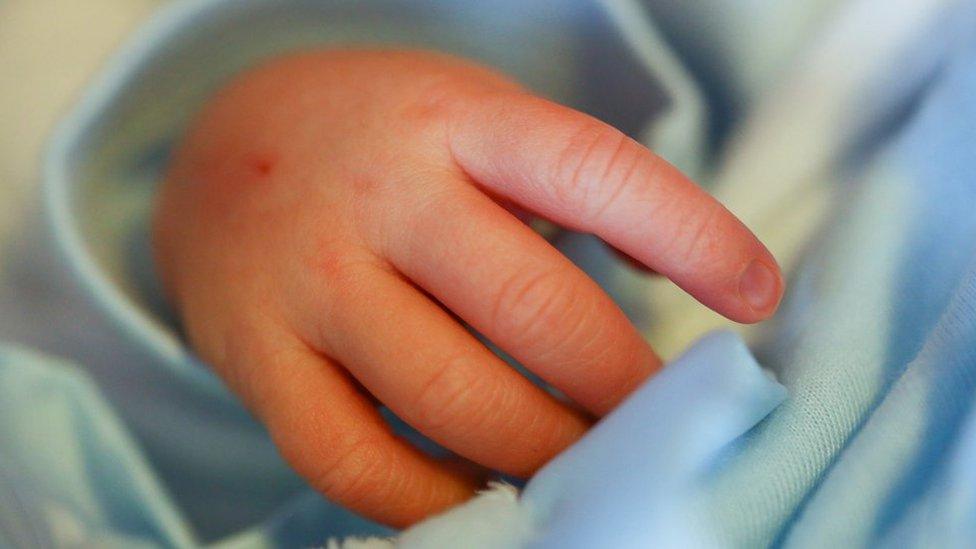Maternity incidents not being reviewed
- Published

The BBC obtained figures via a series of freedom of information requests
Health boards are formally reviewing less than half of the most serious maternity incidents - which include baby deaths.
Figures obtained by the BBC showed 723 "significant adverse events" recorded across Scotland over a six-year period.
Only about 37% of these were reviewed by a full formal process, leading to concerns lessons would not be learned.
Health expert Prof Alan Cameron said there were "inconsistencies" in the way adverse events were recorded.
National guidelines suggest the most serious events should be subject to review.
Some boards said they conducted other types of review or held regular meetings to discuss these events.
Prof Cameron, of the Royal College of Gynaecologists, said it was "extremely important" for health professionals to get together and review cases and a consistent reporting system was vital for that.
Responding to the BBC figures, Health Secretary Shona Robison said she would write to NHS boards about their "consistency" in reviewing incidents.
The figures on significant adverse events in Scottish maternity hospitals were obtained by the BBC via a series of freedom of information requests.
However, not all health boards provided the data requested so the actual figure could be higher.
There was inconsistency among the boards in the terminology used to describe the incidents, with the terms "significant", "major", "extreme" or "serious" all being used.

What is an adverse event?
It is essentially an incident that could have caused, or did, result in, harm or death.
Guidelines from health watchdog Healthcare Improvement Scotland (HIS), external stipulate these events should be classified by health boards into one of three categories depending on their severity.
Category one events could involve an unexpected death.
A category two event could refer to an event that led to initial or prolonged treatment and category three events could include "near miss events".
The HIS framework recommends that every adverse event be reviewed to determine whether there are "learning points" for the organisation to improve its service.
The data obtained by BBC Scotland revealed nationwide discrepancies in how often different boards would conduct formal significant adverse event reviews (SAERs).
For example, NHS Grampian conducted an SAER in 7% of events, while NHS Greater Glasgow and Clyde said it did so in 100% of cases.

'Lucas won't be the last baby to lose his life'

June and Fraser Morton believe hospital staff were overworked in the lead-up to their son Lucas being born
Fraser Morton said NHS Ayrshire and Arran had refused to carry out a review following the death of his son Lucas in Crosshouse Hospital in November 2015.
He believed a shortage of staff and a lack of training contributed to the death of his son.
Although Lucas' death was found to be unnecessary and avoidable, the health board refused to rank it as category one and no SAER was conducted.
NHS Ayrshire and Arran reported at least 39 incidents over a six-year period, and also revealed there had been just two significant adverse event reviews conducted in the same timeframe.
Mr Morton said: "There is supposed to be a national framework on how significant adverse events are progressed and that is not happening.
"The repercussions are that Lucas won't be the last baby to lose his life unnecessarily and we won't be the last family to be devastated unnecessarily."
A spokesperson for the health board said: "A multidisciplinary team reviews each and every perinatal loss.
"This team comprises neonatologists, obstetricians, midwives and perinatal pathologists and investigates the circumstances of the loss, the potential causes and any learning.
"When reviews identify that there has been avoidable harm, we speak with the people affected and report this openly through our clinical governance systems."

Discrepancies in baby deaths statistics

Data from Scotland's health boards revealed that 271 SAERs were conducted into a total of 723 adverse events, which included nearly 200 deaths.
NHS Dumfries and Galloway conducted no SAERs despite reporting 71 events but stated that, while full-blown SAERs were not conducted, internal meetings were still held to review the incidents.
NHS Grampian held 15 reviews despite recording 209 "significant" incidents.
Their freedom of information response stated: "All cases where harm or death has occurred are reviewed by a multidisciplinary team via our clinical risk management process, and all stillbirths and neonatal deaths by a separate multidisciplinary team at a fortnightly stillbirth and neonatal death group since the beginning of 2016.
"Recommendations and learning is shared from both these groups."
The freedom of information data also highlighted a discrepancy between national baby death figures, and baby deaths which were classified as significant adverse events by health boards.
National Records of Scotland recorded 319 perinatal deaths in 2015/16 but only 146 significant adverse events were recorded by health boards that year.

'Importance of consistency'
Scotland's Health Secretary Shona Robison said, as a result of the BBC findings, she would be writing to all health boards to stress the importance of consistency in recording and reviewing adverse events.
She said: "We expect all boards to be consistent in following the national framework and making sure, when there is a significant adverse event review, that there is consistency.
"We wrote to health boards again just a few months ago to stress the importance of consistency and on the back of these figures we will do so again.
"What is also important is that next year, from 1 April, the new duty of candour will come into place with a legal requirement on boards to report and publish SAERs in the same manner."
The BBC understands that last month John Froggatt, deputy director of the child and maternal health division at the Scottish government, also wrote to all the health boards stressing the need for transparency and consistency in dealing with adverse events in maternity units, including events around stillbirths and perinatal deaths.
Prof Cameron, one of the lead investigators on the Each Baby Counts, external project, echoed the call for consistency.
He said: "It's extremely important that health professionals get together in a multi-disciplinary fashion and review the case and see if lessons can be learned, and offer lessons which can be fed back to the parents and it's important we get a consistent reporting system for that."
"What we [the Each Baby Counts project] are trying to do is gather information about why these events happened, and how they were investigated locally, and hopefully drive quality improvement to try and get a consistent way that these events are reviewed and reported."
"In the work we have done so far, we have found inconsistencies in the way adverse events are recorded and reviewed.
"We cannot avoid risk but we must ensure we learn lessons."
- Published15 March 2017

- Published22 November 2016

- Published21 November 2016
